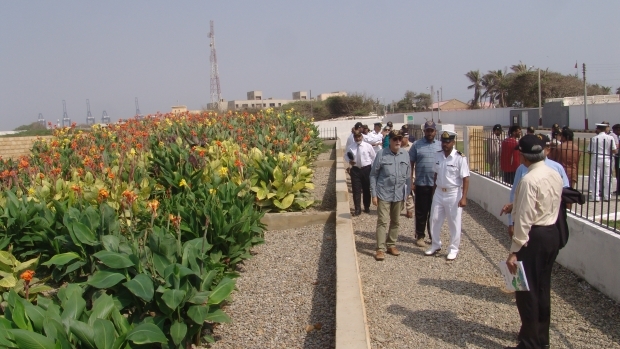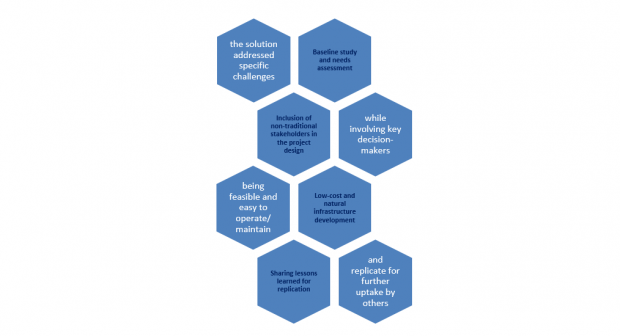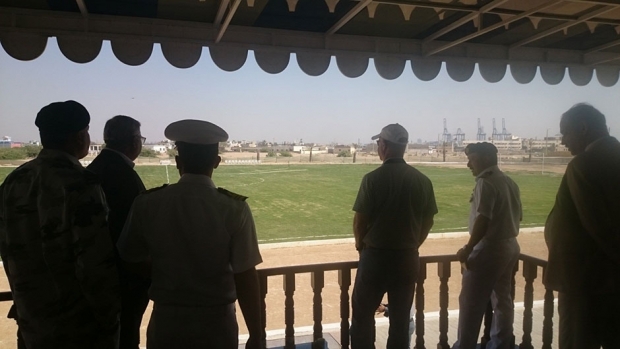Knowledge Hub :: MFF Solutions :: Environment :: Nature based solution for wastewater treatment on Manora Island, Pakistan
Nature based solution for wastewater treatment on Manora Island, Pakistan

Reduction of Sewage Pollution from Manora Island into coasta ... © MFF
The Manora peninsula, once upon a time a charming fishing village, is now plagued with many issues particularly waste and wastewater pollution. As it is very close to the Karachi Port, it is a strategic residential area for the Pakistani Navy, where more than 5000 residents live. Prone to water scarcity, it is highly dependent on the delivery of freshwater by large tankers. The pollution affects all coastal economic activities e.g. fishing, shipping, tourism as well as the livelihoods of small fishing communities. To remediate to the situation, the Pakistan Navy with its coastal mandate, constructed one pilot Reedbed System with support from MFF on Manora Peninsula. Since the pilot has been very successful, it has been replicated in 14 locations along the coast.
Sustainable Development Goals (SDGs)
Challenges
Environmental challenges
- Pollution reduction to restore and increase the protection of marine biodiversity and natural regeneration of mangroves benefitting coastal livelihoods
- Water scarcity Mitigation to decrease risk of water scarcity during drought periods
Social challenges
- Reduction of potential health hazards to decrease the risk of food chain contamination, and water contamination
- Address impaired well-being by increasing the amount of well-maintained green spaces
Economic challenges
- Reduction of impact on fishing industry to ensure healthier fish stocks
- Reduction of impact on tourism to improve aesthetic value
- Reduction of impact on shipping industry to reduce occurrence of corrosion
- Reduction of costs for irrigation/ watering of green spaces
Beneficiaries
Main beneficiaries: 5000 inhabitants in the area
Additional beneficiaries: 150 000 annual visitors
Additional beneficiaries: replication potential
Building Blocks
1) Baseline study and needs assessment
The baseline study consisted of three elements: 1) Situation analysis to analyse the physical environment and the types of pollutants. 2) Review of available secondary literature regarding wastewater treatment techniques. 3) Survey of local stakeholders to assess the suitability of potential wastewater treatment solutions for the needs of the main beneficiaries. 4) Collection of wastewater samples and analysis by a local university.
Enabling factors:
-
consider the country context
-
wastewater analysis and identification of pathogens
-
discussion with stakeholders, understanding needs to allow ownership, maintenance and operations once the project is completed
Lessons learned:
- The baseline study helped in understanding the gravity of marine pollution issues and its impact on marine life and naval infrastructure costing economic loss of millions of rupees; hence, a key priority for Pakistan Navy.
- The marine pollution issue appears largely unattended by respective agencies despite the fact that a Marine Pollution Control Board (MPCB) which is chaired by Minister of Port & Shipping does exist.
- Freshwater scarcity was a key issue in coastal islands.
2) Inclusion of non-traditional stakeholders in project design
The Pakistan Navy operates extensively in this area and has committed to contribute to the protection of coastal environment and conservation of natural resources. The engagement with the Pakistan Navy was key to achieve this project.
Enabling factors:
-
The Pakistan Navy is depending on marine and coastal ecosystems for its operation
-
The Pakistan navy was looking for concrete actions to demonstrate its coastal engagement
-
The Pakistan Navy was seeking solutions to increase the well-being of its employees and families
Lessons learned:
-
MFF engagement with Pakistan Navy generated their interest in addressing other coastal issues such as, mangrove plantation and designation of Astola Island as the first ever marine protected area in Pakistan.
-
A great deed of level of trust and confidence was built and strengthened between a non-traditional actor and civil society.
3) Low-cost and natural infrastructure development
The Reedbed system is a constructed/ artificial wetland system that mimics natural wetland ecosystems. The first experiment was conducted by Dr. Kaethe Seidel, a German botanist, who introduced the idea of using plants to treat wastewater. It is more applicable for sewerage water than for industrial wastewater.
The system follows a 4-steps process where first large contaminants are removed, followed by suspended solids and organic matter, biodegradable matter, and lastly specific pollutants. The vegetation types for the different treatment steps include Canna Indica, Canna Edulis, Typha Spp, Phragmites Spp and Water Lily.
Enabling factors:
-
Area is prone to water-scarcity
-
Large area of land available
-
System’s design should consider wastewater types and climate
-
System is easy to operate and maintain
-
System can be built with local materials
-
System does not require an external energy input
Lessons learned:
-
The constructed wetland not only provides opportunity to adapt low cost biological wastewater treatment technology for treating wastewater and making it reusable for different purposes.
-
Pakistan Navy has adopted and replicated Reedbed system as a good practice to treat wastewater and reuse it for greening purposes across its various locations.
4) Sharing lessons learned for replication
The Reedbed system is a low-cost system that is easy to replicate in other areas. Project results have been documented and disseminated and the lessons shared at various levels and at national and international forums. Exposure visit of media, policymakers and government officials to the Reedbed System site organized. A policy paper on status of marine pollution along the Karachi coast has been prepared for future advocacy on coastal pollution issues.
Enabling factors:
-
Strong interest at national level from policy-makers, industries, urban planners and other stakeholders in low-cost solutions to mitigate wastewater pollution
-
Government aims to find solutions to water-scarcity
-
Low-cost and easy to maintain solution with a high replication potential
-
Raised awareness among all ranks of the Pakistan Navy, media and high-government officials
Lessons learned:
-
The Reedbed system has a greater scope for treating domestic and industrial wastewater and reusing it for various purposes to address water scarcity issue.
-
The project has generated a great deal of interest and awareness among PN ranks for their role in contributing to sustainable coastal environmental management in collaboration with other coastal stakeholders.
-
The project result in enhancing greenery on the Manora Island, saving huge quantities of freshwater and costs of its procurement.
How do the building blocks interact?
Through the situation analysis, data was collected to develop the most suited solution to the issue for a relatively low-cost. The fact that the constructed wetland system is replicable and easy to operate and maintain gives it a strong advantage for consideration. Convincing key stakeholders to invest in the solution became easier when the system had been identified. Although these stakeholders are not the usual ones being approached for wastewater treatment, they have proven very interested in the issue as it is impacting their naval facilities and equipment. To make sure that the solution will be widely replicated, lessons learned have been shared widely. About 14 other systems have been constricted since this pilot has been tested.

Impact
- 115 cubic meters of wastewater treated and repurposed to green public spaces
- About 60,000 USD saved/ year for water supply
- The Pakistan Navy’s awareness has been raised
- A low cost and replicable model has been piloted
An Inspiring Story
Karachi is the capital of the Pakistani province of Sindh. It is the most populous city in Pakistan and is now Pakistan's premier industrial and financial centre. It also serves as a transport hub since it is home to Pakistan's two largest seaports, the Port of Karachi and Port Bin Qasim.
Manora is a small peninsula located just south of the Port of Karachi, which is connected to the mainland by a 12 km long causeway. The area used to be known for its rich coastal ecosystems such as shallow tidal lagoons, intertidal mudflats, saltpans, mangrove swamps and its small fishing village. The site and its sandy beaches are also hosting breeding turtles. However, it has lost a bit of its prestige.
There are about 2500 industries and 17 tanneries in this area as well as cattle production upstream. This buzzling center of activity generates tremendous quantities of solid waste and wastewater that are not managed properly or not managed at all… Despite that, more than 150 000 visitors head to the beach annually, adding another layer of pressure to the fragile ecosystem.
Manora peninsula also faces a scarcity of freshwater, and relies largely on tankers for water supply. The shortage of freshwater access is very challenging for the inhabitants.
To remedy to the pollution situation, the Pakistan Navy –key stakeholder in this area- with the support of MFF, piloted the first constructed wetland in coastal areas of Pakistan. Artificially-constructed wetland is a technology designed to imitate the processes found in natural wetland ecosystems. The system involves a series of gravel filter beds planted with reeds to treat wastewater passing through the root zone. The system is cost-effective as it is less energy-intensive than traditional wastewater treatment techniques and uses natural materials and processes. The wastewater treatment system has been successfully promoted as a wastewater treatment technology by UN-HABITAT in many countries.
Through this system, the Pakistan Navy is now able to treat 115 cubic meters of sewage water to water the Navy’s 3 acres of sports fields and the trees along the roadsides. The low-cost system can be easily replicated in other water-scarce areas. The Pakistan Navy already implemented 14 similar types of systems along the coast. The project has contributed to increasing knowledge and awareness within the Pakistan Navy at various rank levels, and has contributed to the development of a sense of coastal stewardship among them.

People looking at a sports field © MFF
Project Facts
Country
Location
Manora Peninsula Karachi, Pakistan
Topic
Duration
1st Mar 2016 to 28th Feb 2018
MFF Grant Amount
PKR 7,262,500
Co-financing Partner
Pakistan Navy
PKR 2,067,000 (In kind)
Implementing Partner
Pakistan Navy
Captain Usman Tariq
Directorate of Maritime Affairs & Environment Control
Naval Headquarters
E-9 Islamabad
Pakistan
Phone: 051-20062349
Fax: 051-20062656
E-mail: dmaec@paknavy.gov.pk, mwaqasadil7786@gmail.com